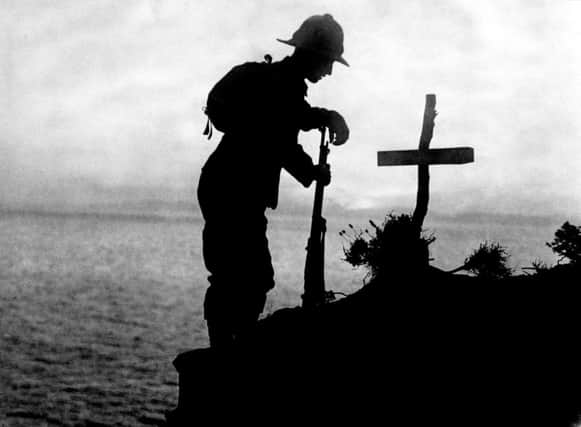Story of the ‘forgotten’ conflicts of the Great War that had a lasting legacy


LATER this month sees the centenary of the start of the Gallipoli campaign.
On April 25, 1915, Allied troops invaded the Gallipoli Peninsula in Turkey with the aim of forcing the Ottoman Empire out of the First World War.
Advertisement
Hide AdAdvertisement
Hide AdHowever, it was as ill-conceived and poorly planned as it was bravely fought by the British, French, Canadians and Anzacs.
A bloody stalemate lasted until the Allied troops evacuated the peninsula in January 1916, by which time 57,000 had lost their lives in a campaign that ended in humiliation for the British government.
But while most people have heard of Gallipoli it wasn’t the only campaign waged in the Middle East and Mesopotamia (modern day Iraq, Kuwait and part of Turkey and Syria) during the war.
While battles raged on the Western Front in Ypres, Bethune and Arras, so it did, too, in places like Basra, Gaza and Baghdad, and many more.
Advertisement
Hide AdAdvertisement
Hide AdIn the Middle East, the war was effectively a tale of two halves. As well as the withdrawal from Gallipoli, the Anglo-Indian force at Kut el Amara, in modern Iraq, was forced to surrender in April, 1916, following a lengthy siege.
The Turkish army proved stronger than many people had realised, but as well as fighting a formidable enemy the Allied troops also had to contend with flies and mosquitoes, along with searing summer heat and freezing winters.
It forced a change of thinking and personnel at the top. In Mesopotamia a new commander, General Sir Stanley Frederick Maude, assembled a large force of 1500,000 men equipped with the modern weapons of war.
In Egypt, too, British forces gained a new leader, General Sir Archibald Murray, who turned a defence of the country into an invasion of Palestine.
Advertisement
Hide AdAdvertisement
Hide AdHolger Afflerbach, Professor of Central European History at the University of Leeds, says Indian soldiers played a crucial role in the fighting in Mesopotamia.
“The number of British troops in these remote theatres of war was limited. It was mostly Indian troops who fought in Mesopotamia,” he says. “Although I’m not aware of many events commemorating this in India.”
This is no doubt bound up in the country’s complicated colonial history, which perhaps also explains why many First World War conflicts in the Middle East don’t resonate in the same way the Somme does in Britain, or Verdun does in France.
They were fighting a different war and for differing reasons. Not that these battles were any less significant in their own way.
Advertisement
Hide AdAdvertisement
Hide AdIt’s interesting, too, given what is happening in Syria today, to note the names of cities like Damascus and Aleppo which witnessed the final collapse of the Ottoman Empire just over a century ago.
By 1917 the British superiority was overwhelming and the Turkish forces were pushed back towards Jerusalem, which fell at the end of that year, and then on to Damascus as the Ottoman Empire, which had stood for eight centuries, began to crumble.
When General Sir Edmund Allenby walked through the Jaffa Gate on December 11 he did so as the first Christian conqueror since the Crusades, although he played down any notion of a crusade.
As Prof Afflerbach points out, the legacy of the various Middle Eastern campaigns and the impact they had in shaping the new world was enormous.
Advertisement
Hide AdAdvertisement
Hide Ad“The political consequences are bigger in this area of the world even than in Europe,” he says.
“If you look at the map after the First World War you see all these new states like Iraq which are a consequence of the Turkish defeat. These former Turkish provinces become independent states after the war and the consequences of this are still felt today.”